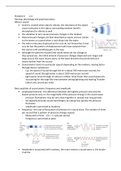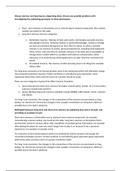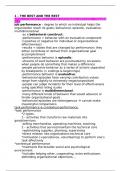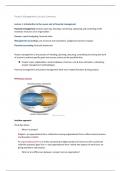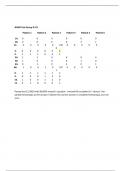Topic 1: The Content and Operation of Contracts
Bob’s Shoe Centre v Heneway Freight Services 1995 (A)
Facts
Appellant imported a consignment of shoes from Portugal, which were then placed in a bonded warehouse
upon arriving in SA to await customs clearance
There was a contract between the parties, and the respondent (who had acted as the appellant’s clearing
agent at customs on previous occasions) was obliged to effect the customs clearance of the shoes and to
then convey them from the warehouse to the appellant’s place of business
The appellant contended that the duties of respondent extended beyond this, and that it was responsible for
the operations from the time the goods were collected from the factory in Portugal, until the goods were
delivered to the appellant’s place of business
- The respondent argues that its contractual liability only began once the goods had arrived at the
airport
In order to effect customs clearance the respondent prepared a bill of entry which was submitted to customs
on 17 July, the bill of entry was incorrect however and so customs required that a voucher of correction be
delivered to it – this voucher was submitted on 19 July and the respondent paid an amount due to customs
in duties – on the 20 July customs issued a release order for the goods, upon presenting the release order to
the customs official, it was discovered that the shoes had been stolen from the warehouse (an unauthorised
person had fraudulently obtained a release order on 18 July)
- The goods were never recovered
The effect of the theft meant that the respondent’s performance became objectively impossible under the
contract – “As a result of the supervening impossibility of performance the respondent, in accordance with
the general rule of our law, was discharged from further performance, while the appellant's corresponding
right to claim further performance was extinguished”
Respondent contended that performance was divisible and, since there had been partial performance, it was
entitled to payment pro tanto
The appellant maintained that the respondent's obligation to deliver the goods at its place of business
formed an indivisible part of the contract and that the contract as a whole was accordingly extinguished
when such delivery became impossible. The appellant further contended that it had derived no benefit from
the respondent's partial performance and had in fact suffered damage as a result of the theft.
Legal Question
Whether the performance in terms of the contract was divisible, and therefore, whether the respondent was
entitled to claim performance from the appellant in respect of that performance which it had already rendered.
Ratio & Judgment
The respondent’s claim was based on contract, and therefore bore the onus of proving its terms
An oral agreement was concluded between representatives of each party, according to the respondent, its
duties in terms of the agreement only commenced once the goods arrived at the airport
“The evidence shows that the parties already had a working business relationship by the time the goods in
question were imported in July 1988 and it was accordingly not necessary for them to spell out what their
respective rights and duties would be in this particular instance.”
It is common cause that, factually, importing the appellant’s goods involved several separate obligations:
- (1) the goods had to be collected by the forwarding agent in Portugal and conveyed to the airport
- (2) there had to be an arrangement made with a certain entity for the carrying of the goods by
means of direct flight to South Africa, and the payment by the forwarding agent of the airfreight to
the entity
- (3) respondent had to attend the arrival of the consignments and reimburse the forwarding agent for
the airfreight
1
, - (4) respondent had to prepare a bill of entry and pay the required duties to customs and obtain
clearance of the goods from customs
- (5) respondent had to take delivery of the goods from customs and convey from airport to
appellant’s place of business
The main defence raised by the appellant was the exceptio non adimpleti contractus – it submitted that the
contract between it and the respondent was a single and indivisible one wherein the respondent was obliged
to bring the goods from Portugal to SA and then to deliver the goods to the appellant’s place of business
- With the appellant only being obliged to pay the respondent once there had been complete
performance of the respondent’s contractual obligation
“The respondent was, of course, relieved of further performance because of the supervening impossibility of
performance caused by the theft of the goods. The appellant contended that the principle of reciprocity
applied to this contract and that, once the respondent's obligation to deliver the goods was extinguished by
the supervening impossibility of performance, the appellant was also discharged from its counter-obligation
to pay.”
The question as to whether the appellant nevertheless remained liable to pay the respondent for services
rendered and the disbursements of the respondent up until performance became impossible depends on
whether or not the performance was divisible:
- Point of departure: “There are no hard-and-fast rules to determine whether a performance is
divisible or indivisible, and no real assistance can be derived from considering the question of
divisibility in this particular case with reference to other types of contract …”
- “The principles governing the severability of an illegal or void provision may, however, be of
assistance when considering the problem of divisibility …”
- (1) “… have regard to the probable intention of the parties as it appears in, or can be inferred from,
the terms of the contract as a whole …”
The intention is crucial, because even though the nature of the performance may indicate
divisibility (e.g. selling a collection of paintings), the parties may not have intended the
performance to be divisible (intend to sell the collection and not individual pieces – i.e.
intended that the collection be seen as one complete item)
However, if the probable intention has to be inferred from the contract as a whole (and is
not present in an express declaration in the contract), then the nature of the performance
may in fact be decisive
- (2) “Performance will usually by its very nature be divisible where the contract makes provision for
separate or distinct performances, but it may also be divisible where the contract provides for a
composite performance which can be subdivided.”
In this case the argument was put forward that “… performance was indivisible solely
because there was allegedly a single indivisible contract.”
But, the divisibility of the contract is not a prerequisite for the divisibility of the performance
- (3) “Divisibility of performance does not depend on the divisibility of the counter-performance …,
but proof of a divisible counter-performance creates a presumption that the performance is also
divisible, provided each distinct performance can be related to a corresponding part of the divided
counter-performance.”
A good indication (as in this case) is where it is possible to assign value in a quid pro quo
manner to aspects of the performance or counter-performance
Therefore, if the performance is capable of being broken down into values which can be
subtracted from the counter-performance if unfulfilled, then the performance is likely to be
a divisible one
- (4) One should also consider whether any of the provisions of the performance are collateral or
subsidiary to the main end/ purpose of the contract – this may also be an indicator of divisibility
“A useful test which can be applied in deciding whether a particular provision of a contract is
subsidiary to the main purpose, and therefore severable from the rest, is to determine
whether the parties would have entered into the contract without that provision.”
If the performance is only subsidiary or collateral to the main purpose of the contract, then
it could be severable from the main contract, and therefore, the performance would be
divisible
2
, Therefore, the court concluded that the transportation of the goods was only subsidiary to the main purpose
of the contract, and that it was therefore severable from the remainder thereof
- Therefore, the performance was divisible
The appellant also argued that the respondent couldn’t rely on the supervening impossibility of performance
because the impossibility was self-created – arising from the appellant’s own breach of contract, therefore,
that the respondent remained bound by the terms of the contract
- The respondent’s failure to deliver a correct customs bill of entry indeed caused a delay in the
customs clearance
- “Assuming that the respondent was liable for the delay, the question still remains whether in law
that delay caused the supervening impossibility of performance. In the final analysis the impossibility
of performance resulted from the theft of the goods and in my view the delay caused by [incorrect]
bill of entry did not contribute causally to that theft.”
- Additionally, even if the customs bill had been correct, it would have in any event taken
approximately two business days for the clearance to be obtained – and the goods were stolen
within that time
- Therefore, the supervening impossibility was not due to the fault of the respondent
A final argument advanced by the appellant was that the respondent bore the risk of loss by virtue of its
being a depositary
- Obiter the court held that the respondent was indeed a depositary
- “In the absence of express agreement to the contrary a depositary in the case of an ordinary
depositum or bailment for reward bears the onus of proving that loss of or damage to the stored
goods was not due to any negligence on his part”
- But – the depositary is not the insurer of the article and thus cannot be liable for effects of a casus
fortuitus, the respondent was able to prove that the theft was as a result of a casus fortuitus and
therefore, did not bear the risk of loss
Therefore, the court found in favour of the respondent, and that it was entitled to claim what was owed to it
by the appellant in terms of the contract in a pro rata share for what it had already performed
Stocks & Stocks v TJ Daly & Sons 1979 (A)
Facts
Appellants gave their crane to respondents in order to be transported. This crane was damaged during the
transport exercise, as a result of this, appellants claimed damages for breach of contract
Respondents argued that there was an owner’s risk clause in their contract, and the purpose of this clause is
to exempt the party who relies on it from being liable for any damages
Additionally, the respondents counterclaimed for its transportation charges
The trial court ordered absolution from the instance, holding that the appellant had failed to discharge the
onus of showing that the owner’s risk clause was not a part of the contract (as alleged by the respondent)
Legal Question
1. Had the crane been transported at the risk of the appellant, and was the respondent therefore not liable for
damages in respect thereof? i.e. was there an incidentalia in the contract which varied the naturalia thereof?
2. Was the trial court wrong to place the onus of proof on the appellant (proving the absence of a term)?
Ratio & Judgment
This contract concluded between Stocks & Stocks and TJ Daly was one of deposit or bailment – this contract
arises when a party places something in the custody of another party for safe keeping
A naturalia of this contract of deposit is that the person in whose safekeeping the good is placed, is
automatically liable to pay damages if those goods are damaged while in the case of that party, unless they
can prove that the damage occurred through no fault of their own
One way to change that automatic consequence is by means of including an owner’s risk clause – so this case
is essentially about what the exact content of the contract was between Stocks & Stocks and TJ Daly was
3
Bob’s Shoe Centre v Heneway Freight Services 1995 (A)
Facts
Appellant imported a consignment of shoes from Portugal, which were then placed in a bonded warehouse
upon arriving in SA to await customs clearance
There was a contract between the parties, and the respondent (who had acted as the appellant’s clearing
agent at customs on previous occasions) was obliged to effect the customs clearance of the shoes and to
then convey them from the warehouse to the appellant’s place of business
The appellant contended that the duties of respondent extended beyond this, and that it was responsible for
the operations from the time the goods were collected from the factory in Portugal, until the goods were
delivered to the appellant’s place of business
- The respondent argues that its contractual liability only began once the goods had arrived at the
airport
In order to effect customs clearance the respondent prepared a bill of entry which was submitted to customs
on 17 July, the bill of entry was incorrect however and so customs required that a voucher of correction be
delivered to it – this voucher was submitted on 19 July and the respondent paid an amount due to customs
in duties – on the 20 July customs issued a release order for the goods, upon presenting the release order to
the customs official, it was discovered that the shoes had been stolen from the warehouse (an unauthorised
person had fraudulently obtained a release order on 18 July)
- The goods were never recovered
The effect of the theft meant that the respondent’s performance became objectively impossible under the
contract – “As a result of the supervening impossibility of performance the respondent, in accordance with
the general rule of our law, was discharged from further performance, while the appellant's corresponding
right to claim further performance was extinguished”
Respondent contended that performance was divisible and, since there had been partial performance, it was
entitled to payment pro tanto
The appellant maintained that the respondent's obligation to deliver the goods at its place of business
formed an indivisible part of the contract and that the contract as a whole was accordingly extinguished
when such delivery became impossible. The appellant further contended that it had derived no benefit from
the respondent's partial performance and had in fact suffered damage as a result of the theft.
Legal Question
Whether the performance in terms of the contract was divisible, and therefore, whether the respondent was
entitled to claim performance from the appellant in respect of that performance which it had already rendered.
Ratio & Judgment
The respondent’s claim was based on contract, and therefore bore the onus of proving its terms
An oral agreement was concluded between representatives of each party, according to the respondent, its
duties in terms of the agreement only commenced once the goods arrived at the airport
“The evidence shows that the parties already had a working business relationship by the time the goods in
question were imported in July 1988 and it was accordingly not necessary for them to spell out what their
respective rights and duties would be in this particular instance.”
It is common cause that, factually, importing the appellant’s goods involved several separate obligations:
- (1) the goods had to be collected by the forwarding agent in Portugal and conveyed to the airport
- (2) there had to be an arrangement made with a certain entity for the carrying of the goods by
means of direct flight to South Africa, and the payment by the forwarding agent of the airfreight to
the entity
- (3) respondent had to attend the arrival of the consignments and reimburse the forwarding agent for
the airfreight
1
, - (4) respondent had to prepare a bill of entry and pay the required duties to customs and obtain
clearance of the goods from customs
- (5) respondent had to take delivery of the goods from customs and convey from airport to
appellant’s place of business
The main defence raised by the appellant was the exceptio non adimpleti contractus – it submitted that the
contract between it and the respondent was a single and indivisible one wherein the respondent was obliged
to bring the goods from Portugal to SA and then to deliver the goods to the appellant’s place of business
- With the appellant only being obliged to pay the respondent once there had been complete
performance of the respondent’s contractual obligation
“The respondent was, of course, relieved of further performance because of the supervening impossibility of
performance caused by the theft of the goods. The appellant contended that the principle of reciprocity
applied to this contract and that, once the respondent's obligation to deliver the goods was extinguished by
the supervening impossibility of performance, the appellant was also discharged from its counter-obligation
to pay.”
The question as to whether the appellant nevertheless remained liable to pay the respondent for services
rendered and the disbursements of the respondent up until performance became impossible depends on
whether or not the performance was divisible:
- Point of departure: “There are no hard-and-fast rules to determine whether a performance is
divisible or indivisible, and no real assistance can be derived from considering the question of
divisibility in this particular case with reference to other types of contract …”
- “The principles governing the severability of an illegal or void provision may, however, be of
assistance when considering the problem of divisibility …”
- (1) “… have regard to the probable intention of the parties as it appears in, or can be inferred from,
the terms of the contract as a whole …”
The intention is crucial, because even though the nature of the performance may indicate
divisibility (e.g. selling a collection of paintings), the parties may not have intended the
performance to be divisible (intend to sell the collection and not individual pieces – i.e.
intended that the collection be seen as one complete item)
However, if the probable intention has to be inferred from the contract as a whole (and is
not present in an express declaration in the contract), then the nature of the performance
may in fact be decisive
- (2) “Performance will usually by its very nature be divisible where the contract makes provision for
separate or distinct performances, but it may also be divisible where the contract provides for a
composite performance which can be subdivided.”
In this case the argument was put forward that “… performance was indivisible solely
because there was allegedly a single indivisible contract.”
But, the divisibility of the contract is not a prerequisite for the divisibility of the performance
- (3) “Divisibility of performance does not depend on the divisibility of the counter-performance …,
but proof of a divisible counter-performance creates a presumption that the performance is also
divisible, provided each distinct performance can be related to a corresponding part of the divided
counter-performance.”
A good indication (as in this case) is where it is possible to assign value in a quid pro quo
manner to aspects of the performance or counter-performance
Therefore, if the performance is capable of being broken down into values which can be
subtracted from the counter-performance if unfulfilled, then the performance is likely to be
a divisible one
- (4) One should also consider whether any of the provisions of the performance are collateral or
subsidiary to the main end/ purpose of the contract – this may also be an indicator of divisibility
“A useful test which can be applied in deciding whether a particular provision of a contract is
subsidiary to the main purpose, and therefore severable from the rest, is to determine
whether the parties would have entered into the contract without that provision.”
If the performance is only subsidiary or collateral to the main purpose of the contract, then
it could be severable from the main contract, and therefore, the performance would be
divisible
2
, Therefore, the court concluded that the transportation of the goods was only subsidiary to the main purpose
of the contract, and that it was therefore severable from the remainder thereof
- Therefore, the performance was divisible
The appellant also argued that the respondent couldn’t rely on the supervening impossibility of performance
because the impossibility was self-created – arising from the appellant’s own breach of contract, therefore,
that the respondent remained bound by the terms of the contract
- The respondent’s failure to deliver a correct customs bill of entry indeed caused a delay in the
customs clearance
- “Assuming that the respondent was liable for the delay, the question still remains whether in law
that delay caused the supervening impossibility of performance. In the final analysis the impossibility
of performance resulted from the theft of the goods and in my view the delay caused by [incorrect]
bill of entry did not contribute causally to that theft.”
- Additionally, even if the customs bill had been correct, it would have in any event taken
approximately two business days for the clearance to be obtained – and the goods were stolen
within that time
- Therefore, the supervening impossibility was not due to the fault of the respondent
A final argument advanced by the appellant was that the respondent bore the risk of loss by virtue of its
being a depositary
- Obiter the court held that the respondent was indeed a depositary
- “In the absence of express agreement to the contrary a depositary in the case of an ordinary
depositum or bailment for reward bears the onus of proving that loss of or damage to the stored
goods was not due to any negligence on his part”
- But – the depositary is not the insurer of the article and thus cannot be liable for effects of a casus
fortuitus, the respondent was able to prove that the theft was as a result of a casus fortuitus and
therefore, did not bear the risk of loss
Therefore, the court found in favour of the respondent, and that it was entitled to claim what was owed to it
by the appellant in terms of the contract in a pro rata share for what it had already performed
Stocks & Stocks v TJ Daly & Sons 1979 (A)
Facts
Appellants gave their crane to respondents in order to be transported. This crane was damaged during the
transport exercise, as a result of this, appellants claimed damages for breach of contract
Respondents argued that there was an owner’s risk clause in their contract, and the purpose of this clause is
to exempt the party who relies on it from being liable for any damages
Additionally, the respondents counterclaimed for its transportation charges
The trial court ordered absolution from the instance, holding that the appellant had failed to discharge the
onus of showing that the owner’s risk clause was not a part of the contract (as alleged by the respondent)
Legal Question
1. Had the crane been transported at the risk of the appellant, and was the respondent therefore not liable for
damages in respect thereof? i.e. was there an incidentalia in the contract which varied the naturalia thereof?
2. Was the trial court wrong to place the onus of proof on the appellant (proving the absence of a term)?
Ratio & Judgment
This contract concluded between Stocks & Stocks and TJ Daly was one of deposit or bailment – this contract
arises when a party places something in the custody of another party for safe keeping
A naturalia of this contract of deposit is that the person in whose safekeeping the good is placed, is
automatically liable to pay damages if those goods are damaged while in the case of that party, unless they
can prove that the damage occurred through no fault of their own
One way to change that automatic consequence is by means of including an owner’s risk clause – so this case
is essentially about what the exact content of the contract was between Stocks & Stocks and TJ Daly was
3



